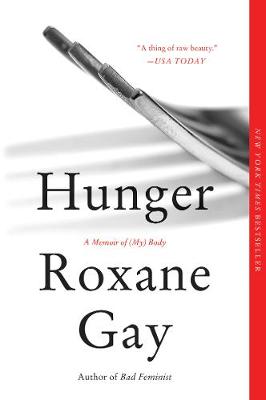Reviewed by Amber (The Literary Phoenix) on
Okay. So. There is nothing fundamentally wrong with Hunger. In fact, it’s a very raw, honest memoir about a topic that is so deeply personal. The stories Roxane Gay shares are intense and difficult to read. You’re not supposed to love this book, but you are supposed to respect and support it.
I still didn’t like it. And not in that “this makes me uncomfortable, so I dislike it” way. It’s the writing style. Roxane Gay tells her stories in such a way that unapologetically calls out the types of things that cause shame to people like herself (which is good) and describes the ways her body makes her feel like she’s trapped in a cage. Her writing style includes a lot of repetition. This is bound to happen in a 300 page book that talks about only one topic. She tells the same stories in different settings.
Again, there’s nothing wrong with this. Her writing style is fine and the points she makes are incredibly important. But as a book this didn’t work for me. There’s nothing wrong with the book. There’s lots of things are right about the book. But we weren’t a match. And that should be okay, right? But when it’s a well-loved book, and it’s about so potent and important a topic, and when it’s a memoir, it’s difficult to say I didn’t enjoy it. The only thing that kept me from DNF-ing this was the hope that the next essay would rope me in. Or the next one. Or the next one.
Roxane talks about her relationship with her body. She discusses the events that adjusted that relationship. She is vulnerable and open regarding the way she is treated and the challenges she has to overcome in order to experience the fullness of life so many of us take for granted. All in all, it’s a very powerful memoir that reminded me to acknowledge my privileged. It’s so easy to get sucked into our own lives that we forget how easy we have things, in regards to so many details – gender, race, class, religion, weight. It’s so important to have books like Hunger out there in the universe to perpetuate change.
If you are already a fan of Roxane Gay’s writing or enjoy powerfully moving memoirs, I cannot recommend this enough and please don’t let my own experience dissuade you. Hunger screams to the universe of our own prejudices and shares a unique story that will make you sad, and will make you angry in all the ways that matter.
Reading updates
- Started reading
- 16 August, 2019: Finished reading
- 16 August, 2019: Reviewed
